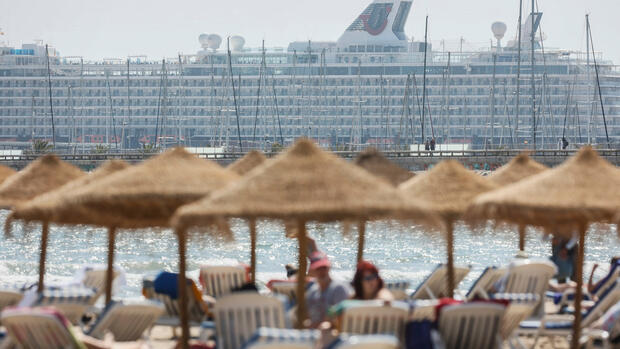Frankfurt People’s desire to travel is apparently unbroken. This is shown by the half-year figures presented by the Tui tourism group on Wednesday morning. In the first half of the 2023 financial year (between October 2022 and March 2023), sales increased by a good 53 percent to 6.9 billion euros compared to the same period a year earlier.
The bottom line is that the Hanover-based group made another loss, also because of the seasonally weaker start to the year in the industry compared to the summer half-year. But the group loss fell from 708 million to 558 million euros. “It will be a strong summer and a good 2023 financial year with a significantly higher positive result,” said CEO Sebastian Ebel in a statement.
So is everything good again at Tui after the almost-out in the corona pandemic? Almost – if it weren’t for the share price. The Tui paper has been stuck at just over six euros for weeks. The paper should actually be worth between nine and ten euros. The company had merged shares a few months ago. Ten shares became one, and their value increased accordingly. Without the share merger, the price would have been too low to issue new shares.
But the Tui share never reached its calculated value. With the capital increase, the new papers were issued for EUR 5.55. The capital increase was successful with gross issue proceeds of 1.8 billion euros because the banks had guaranteed it. However, no buyers were initially found for around nine percent of the paper, they were sold to “qualified investors” via a so-called core placement.
So far, the investment has not paid off for the shareholders. At a good three billion euros, TUI is currently worth as much as it was in December last year, before the capital measures were announced. This causes frustration, also within the Tui management, as the Handelsblatt learned from the business environment. Especially since there is no clear explanation for the development of the share price.
The manager has set out to regain the confidence of the capital market. But as the share price shows, that’s a long way to go.
(Photo: TUI)
Like many companies in the travel industry, Tui had to be saved from the end with state aid. The company received 4.3 billion euros through various instruments. But Tui has paid back the aid in full, also with the funds from the capital increase. This means that the shareholders no longer have to fear that the state will still get involved with Tui – one of the contractually agreed options in the course of the rescue.
Security of an anchor shareholder is missing
At the same time, business is up and running again after the slump in the corona pandemic. This is not only shown by the current figures. The outlook for the coming weeks and months is also encouraging. “We want to return to old strength,” said Tui boss Ebel. The group promises this not only to customers, employees and partners, “in particular to the shareholders, who made the successful implementation of our capital increase possible in the first place”.
One possible explanation for the meager share price: Investors lack the security that a large anchor shareholder would provide. The Russian major shareholder Alexei Mordashov, who until recently held around 30 percent of Tui, took on this role for several years. He also supported the group in several capital increases.
>> Read also: Last minute is becoming obsolete for vacationers
But because of Russia’s attack on Ukraine, Mordashov is on the sanctions list. He was not allowed to participate in the last capital measure. As a result, his stake in Tui has fallen significantly. CEO Ebel has repeatedly emphasized that he is positive about the entry of a new anchor investor. However, none are in sight yet.
Another possible explanation for the weak share price: many investors could have waited with their purchase for the Tui share to continue to give way. Finally, with Helikon, a so-called short seller is also involved, who is betting on falling prices. Most recently, however, Helikon had separated from papers again. A possible sign that things could go up again.
This is supported by the fact that the first institutional investors are buying shares in the tourism group again. Union Investment recently acquired a good three percent in Tui. The financial investor Blackrock, on the other hand, has slightly increased its package to just over three percent.
You apparently see upside potential in the Tui share. Concerns that customers might be reluctant to plan their holidays in view of the sharp increase in the cost of living and the unusually high rate of inflation have not yet been confirmed. You keep traveling. As the largest European travel group, Tui should benefit from this. The former arch-rival Thomas Cook is now insolvent and gone.
Most analysts then attest the tourism group good prospects. The average price target of the experts is around 15 euros. After the capital increase and the strengthened balance sheet, Fehmi Ben Naamane from the investment bank Oddo BHF now sees an attractive risk/opportunity ratio. Cristian Nedelcu from UBS recently judged similarly. After completion of the capital measures, the current valuation level is attractive.
More: New Tui boss relies on individual package trips – with flat-rate customer protection
